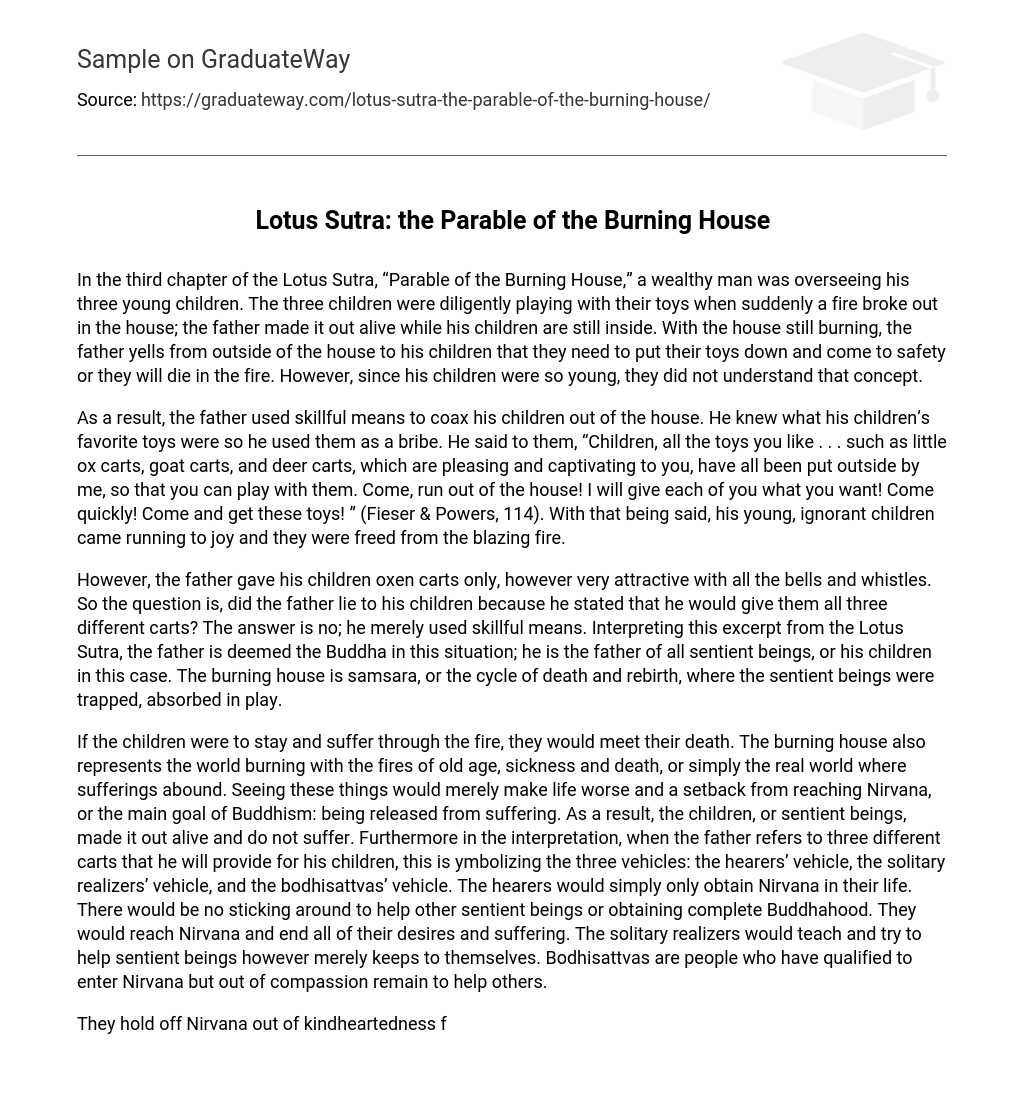In the third chapter of the Lotus Sutra, “Parable of the Burning House,” a wealthy man was overseeing his three young children. The three children were diligently playing with their toys when suddenly a fire broke out in the house; the father made it out alive while his children are still inside. With the house still burning, the father yells from outside of the house to his children that they need to put their toys down and come to safety or they will die in the fire. However, since his children were so young, they did not understand that concept.
As a result, the father used skillful means to coax his children out of the house. He knew what his children’s favorite toys were so he used them as a bribe. He said to them, “Children, all the toys you like . . . such as little ox carts, goat carts, and deer carts, which are pleasing and captivating to you, have all been put outside by me, so that you can play with them. Come, run out of the house! I will give each of you what you want! Come quickly! Come and get these toys! ” (Fieser & Powers, 114). With that being said, his young, ignorant children came running to joy and they were freed from the blazing fire.
However, the father gave his children oxen carts only, however very attractive with all the bells and whistles. So the question is, did the father lie to his children because he stated that he would give them all three different carts? The answer is no; he merely used skillful means. Interpreting this excerpt from the Lotus Sutra, the father is deemed the Buddha in this situation; he is the father of all sentient beings, or his children in this case. The burning house is samsara, or the cycle of death and rebirth, where the sentient beings were trapped, absorbed in play.
If the children were to stay and suffer through the fire, they would meet their death. The burning house also represents the world burning with the fires of old age, sickness and death, or simply the real world where sufferings abound. Seeing these things would merely make life worse and a setback from reaching Nirvana, or the main goal of Buddhism: being released from suffering. As a result, the children, or sentient beings, made it out alive and do not suffer. Furthermore in the interpretation, when the father refers to three different carts that he will provide for his children, this is ymbolizing the three vehicles: the hearers’ vehicle, the solitary realizers’ vehicle, and the bodhisattvas’ vehicle. The hearers would simply only obtain Nirvana in their life. There would be no sticking around to help other sentient beings or obtaining complete Buddhahood. They would reach Nirvana and end all of their desires and suffering. The solitary realizers would teach and try to help sentient beings however merely keeps to themselves. Bodhisattvas are people who have qualified to enter Nirvana but out of compassion remain to help others.
They hold off Nirvana out of kindheartedness for sentient beings. With this being said, the bodhisattvas’ vehicle would be the utmost important to the Buddha and leading his sentient beings to the single greatest vehicle of the bodhisattvas’. In this chapter of the Lotus Sutra, the great vehicle is symbolized by the ox. The father chose the cart pulled by the ox to give to his children. There is hardly a comparison between the ox and the goat and deer in terms of strength and power. The ox is the strongest, most hard-working out of the three so the father blessed his children with nothing but the best.
This chapter of the Lotus Sutra has such meaning and can be interpreted many different ways. The main focus was whether the father was being dishonest, when in actuality he was saving his children from suffering so they would have a chance to find Nirvana. It is a good Samaritan act and should not be interpreted as a lie. Because the father was thought quickly, he became a hero and even blessed his children with all the right means to success in life.
Works Cited
Fieser, James and Powers, John. Scriptures of the World’s Religions. Lotus Sutra: Parable of the Burning House. 4th edition. McGraw Hill. 2012





